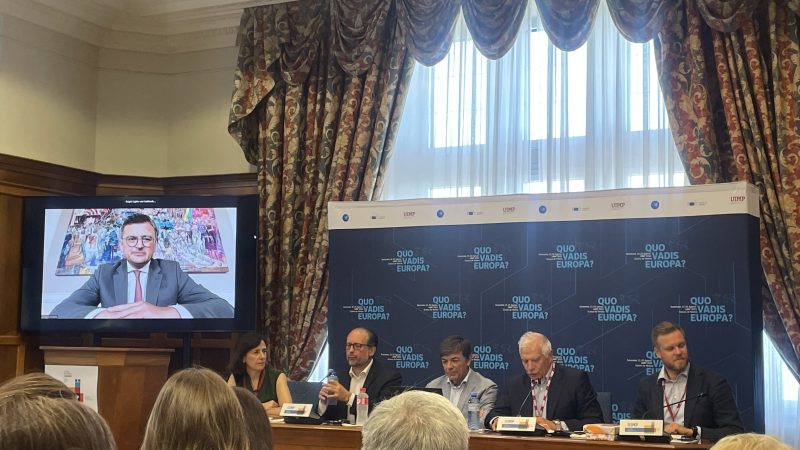Western reluctance to deliver all necessary weapons systems to Ukraine is proving costly, and a different approach could have turned the tide of the war, says EU foreign policy chief Josep Borrell , Monday (August 21).
“When deciding to help a country invaded militarily […], hesitation can be a very costly response,” said Borrell, who was speaking at a seminar in the Spanish city of Santander, alongside Austrian Foreign Minister Alexander Schallenberg and his Lithuanian counterpart Gabrielius Landsbergis.
He clarified that as far as the “hesitation” of the West is concerned, if decisions had been made more quickly and in advance about the weapons systems that were finally sent, “the war would have probably took another turn and, in any case, we would have saved lives”.
Mr Borrell also questioned why the West has only gradually increased its support for Ukraine, referring to the decision to first set limits on different weapons systems before deciding ultimately to supply them to Kiev.
“Why doesn’t the United States give Ukraine a long-range weapons capability? The UK will. Everyone therefore has a different approach […] because the assessment of risk, or fear, is different,” he explained.
He added, however, that he did not believe it was a “deliberate tactic of the type ‘I will only lend my support in dribs and drabs’ to keep the war going and so I can weaken Russia for free. ” ”.
According to him, the hesitation is “more political” and linked to the “internal balances of the American political system and the fear of provoking some form of reaction” from Russia.
Earlier, on the same subject, Mr. Landsbergis wondered why Ukraine did not benefit from all the means of pressure necessary for its victory.
“Either the situation was not seen as serious enough […] or there was fear of what would happen with Russia if we gave Ukraine enough leverage, the effect proved to be effective and a power nuclear was losing a war it had started,” said Mr. Landsbergis.
“ If [this fear] drives a policy of not giving major leverage to Ukraine, then we are entering a new chapter in which ‘power is right’, it’s a very dangerous world ” , he added.
Counteroffensive
Ukrainian Foreign Minister Dmytro Kuleba, who was attending the event via video conference, denied Russia’s rhetoric that Denmark and the Netherlands’ recent decision to deliver F-16 fighter jets to Ukraine would represent an “escalation of violence”.
“This is not the case, we are defending our values, […] the counter-offensive is underway and will progress, even if it is not advancing as quickly as many hoped,” Kuleba said, dismissing critics on the slowness of the counter-offensive.
His comments follow a US intelligence report earlier this week that Ukrainian forces are unlikely to reach and retake the Russian-occupied strategic southeastern town of Melitopol. during their counter-offensive.
Mr Borrell welcomed the decision on the F-16 fighter jets, adding that the EU could potentially cover some of the costs, as it has done for previous military aid, if member states request it. under the European Peace Facility (EFF).
However, he warned that “unfortunately, [the F-16s] will not be used very quickly”, because the Ukrainian pilots must first be trained. “The sooner they start, the better,” he continued.
Ukraine is handicapped by the absence of “air support and long-range missiles” which, according to Borrell, “would be more than necessary” to prevent Russia from continuing to bomb Ukrainian cities.
The first Western fighter jets are expected to arrive in Ukraine early next year.
Peace talks in September
The most recent round of peace talks on Ukraine, held in early August in Jeddah, Saudi Arabia, and attended by more than 40 countries, including China, is “another step taken by Ukraine to incite the international community to put pressure on Russia to end the war ”, explained Mr. Borrell.
In the process, a “ high-level meeting ” which could “ probably take place ” at the end of September, possibly in the form of a ministerial meeting on the sidelines of the United Nations General Assembly, could look into peace in Ukraine,” Borrell told reporters.
This article is originally published on euractiv.fr


